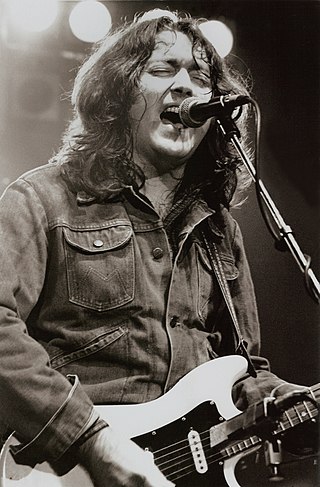
William Rory Gallagher was an Irish musician and songwriter. He is known for his virtuosic style of guitar playing, and is often referred to as "the greatest guitarist you've never heard of". A number of guitarists, including Alex Lifeson of Rush, Brian May of Queen, and Eric Clapton, have cited Gallagher as an influence. He was voted as guitarist of the year by Melody Maker magazine in 1972, and listed as the 57th greatest guitarist of all time by Rolling Stone magazine in 2015.

Clifton Chenier, was an American musician known as a pioneer of zydeco, a style of music that arose from Creole music, with R&B, blues, and Cajun influences. He sang and played the accordion. Chenier won a Grammy Award in 1983.
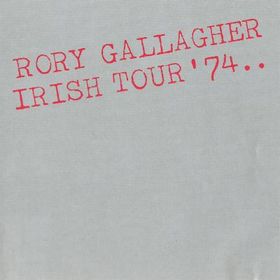
Irish Tour '74 is the sixth album by Rory Gallagher. It is a live album compiled from performances during Gallagher's Irish Tour in January 1974. The source concerts were recorded at Belfast Ulster Hall, Dublin Carlton Cinema and Cork City Hall using Ronnie Lane's Mobile Studio. "Back on My Stompin' Ground " was recorded from a jam session during the tour. Irish Tour '74 has sold in excess of two million copies worldwide. An article in a Belfast daily newspaper stated: "Rory Gallagher never forgot Northern Ireland, he returned throughout the '70s when few other artists of his calibre dared come near the place."
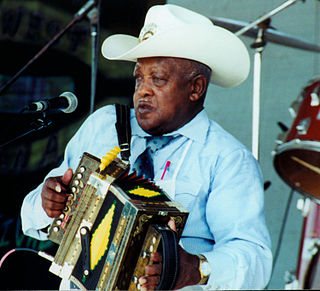
Wilson Anthony "Boozoo" Chavis was an American accordion player, singer, songwriter and bandleader. He was one of the pioneers of zydeco, the fusion of Louisiana Creole and blues music developed in southwest Louisiana.

"Messin' with the Kid" is a rhythm and blues-influenced blues song originally recorded by Junior Wells in 1960. Chief Records owner/songwriter/producer Mel London is credited as the songwriter. Considered a blues standard, it is Junior Wells's best-known song. "Messin' with the Kid" was inducted into the Blues Hall of Fame and has been recorded by a variety of blues and other artists.

John Gerard McAvoy is a Northern Irish blues rock bass guitarist. He played with blues rock musician Rory Gallagher between 1970 and 1991, and then with Nine Below Zero until 2011.
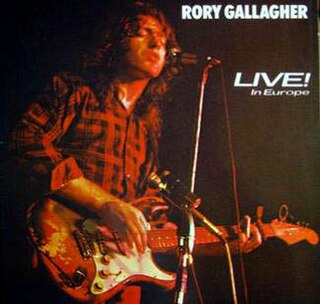
Live! in Europe is the third album by Irish blues guitarist Rory Gallagher, released in 1972. It is a series of live recordings made during his European tour that year. Unusual for a live album, it contains only two songs previously recorded and released by Gallagher. The other songs are either new Gallagher songs or Gallagher's interpretation of traditional blues songs.

Rory Gallagher is the debut solo album by Irish blues rock musician Rory Gallagher, released in 1971. It marked his departure from the first band he formed, Taste. After disbanding Taste, Gallagher auditioned some of the best musicians available at the time. Noel Redding and Mitch Mitchell, the bassist and drummer for the Jimi Hendrix Experience, were among those considered for the new combo. He decided on two Belfast musicians, drummer Wilgar Campbell and bass guitarist Gerry McAvoy, to be the core of his new power trio band.

Blueprint is the third studio album and fourth album overall by Irish guitarist Rory Gallagher, released as a vinyl record in 1973. It entered the UK album charts on 24 February, and reached No. 12. With his first band Taste and with his solo band up to this point Gallagher was one of the first guitarists to lead a power trio lineup. With Blueprint Gallagher included a keyboardist for the first time.

Photo-Finish is the seventh studio album and ninth album overall by Irish musician Rory Gallagher, released in 1978. It marked a turning point in Gallagher's career. Most of the songs on Photo-Finish were initially recorded on what was to be an earlier album, but Gallagher was unhappy with the recordings. He fired the drummer and keyboardist from his current band and replaced only the drummer changing the band to a power trio as his original bands had been.
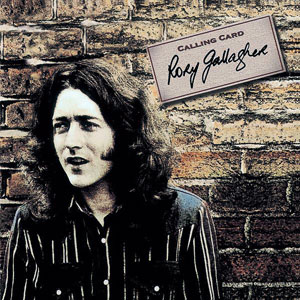
Calling Card is the sixth studio album and eighth album overall by Irish singer/guitarist Rory Gallagher. A 1976 release, it was his second of four albums released on Chrysalis Records in the 1970s. Deep Purple/Rainbow bass guitarist Roger Glover co-produced with Gallagher: it was the first time that Gallagher worked with a "name" producer and the only successful such collaboration. It was also the last album Gallagher would do with Rod de'Ath (drums) and Lou Martin (keyboards). After the Tour to Calling Card, Gallagher retained only his long-time bass guitarist Gerry McAvoy and hired Ted McKenna on drums. This revised power trio was Gallagher's line up from early 1978 until 1980.

C. J. Chenier is the Creole son of the Grammy Award-winning "King of Zydeco", Louisiana musician, Clifton Chenier. In 1987, Chenier followed in his father's footsteps and led his father's band as an accordion performer and singer of zydeco, a blend of cajun and creole music. With five previous albums to his credit, by 1994, Chenier began to record for Chicago-based Alligator Records.

BBC Sessions is a blues rock album by Rory Gallagher, released in 1999. The album was compiled from live recordings made at the BBC by Gallagher's brother Dónal and released posthumously.
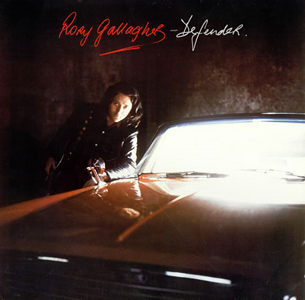
Defender is the thirteenth album and tenth studio album by Irish musician Rory Gallagher. Coming after a five-year hiatus from the recording studio, it was his first album released on the Capo label.

The discography of Rory Gallagher, an Irish guitarist and singer-songwriter, consists of 11 studio albums, 6 live albums, 13 compilations, and 5 singles. Gallagher was a solo artist for much of his career and collaborated with artists such as Muddy Waters and Jerry Lee Lewis. Before his career as a solo artist, Gallagher was the guitarist, vocalist, and saxophonist for the Irish rock trio Taste.

Irish Tour '74 is a film directed by Tony Palmer. It documents Rory Gallagher's tour of Ireland in 1974. Gallagher toured at a time of great political turmoil and violence. Gallagher's band at the time was Gerry McAvoy on bass guitar, Lou Martin on keyboards and Rod de'Ath on drums.

Nathan Williams Sr. is an American zydeco accordionist, singer and songwriter. He established his band Nathan & the Zydeco Cha Chas in 1985.

Bogalusa Boogie is a studio album by the American zydeco musician Clifton Chenier. It was released in 1975 via Arhoolie Records. The album was inducted into the Grammy Hall of Fame in 2011. In 2016, the album was inducted into the Library of Congress' National Recording Registry.

Follow Me Chicken is an album by the American musician Nathan Williams, released in 1993. He is credited with his band, the Zydeco Cha Chas.

Too Much Fun is an album by the American musician C. J. Chenier, released in 1995. He is credited with his backing band, the Red Hot Louisiana Band. It was his first album for Alligator Records. Chenier supported it with a North American tour. The first single was "Man Smart, Woman Smarter".



















